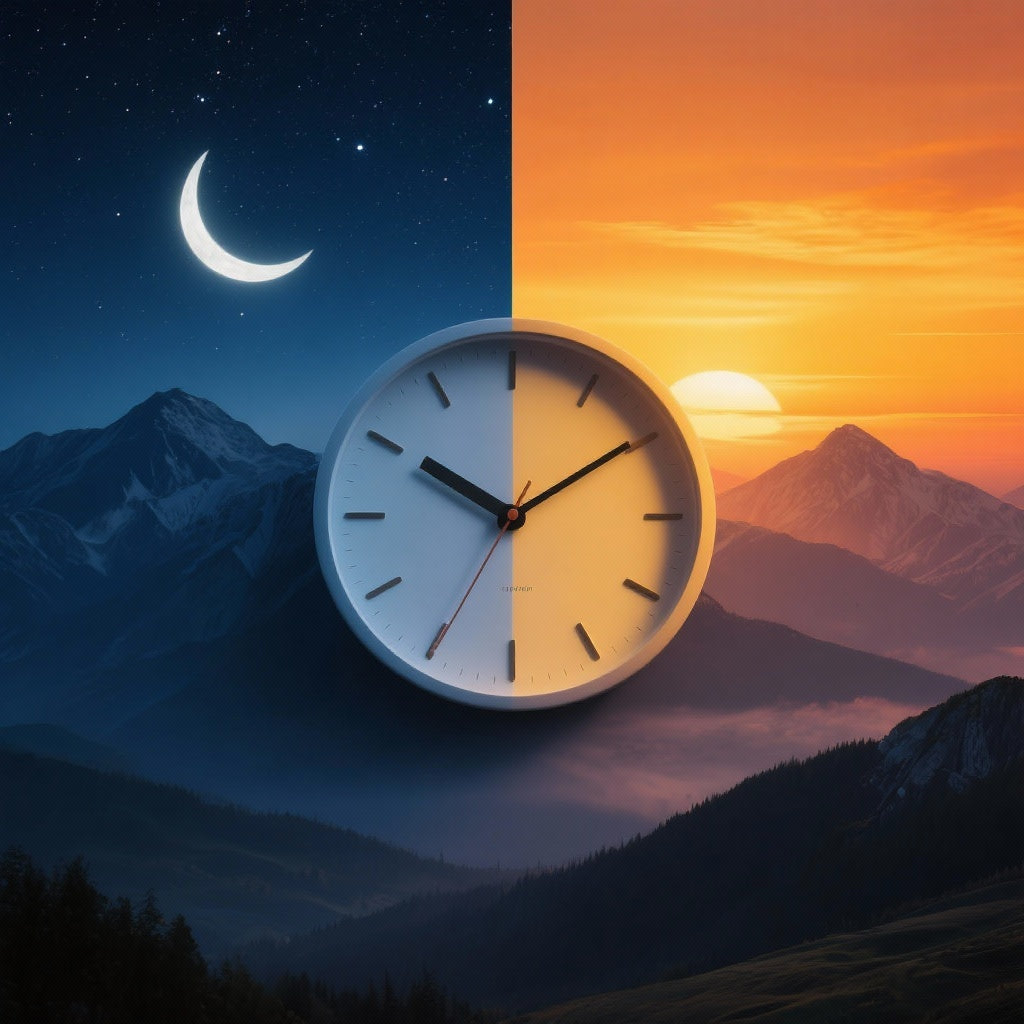What is the circadian rhythm and why does it control your energy level?
Have you ever felt completely exhausted at 3 p.m., even after a night's sleep you thought was restful? Or stared at the ceiling at 2 a.m., your mind racing? You're not alone. These energy roller coasters aren't inevitable, but rather a symptom of an imbalance in your internal clock. This invisible conductor, known as the circadian rhythm, governs far more than your sleep-wake cycle; it dictates your energy, your mood, and even your metabolism. In this article, we'll decipher the code of this biological clock, understand why it's so easily disrupted in our modern world, and give you concrete, scientifically proven strategies to recalibrate it. Get ready to take back control of your vitality, from sunrise to sunset.
What is Circadian Rhythm? The Essential Definition
At the heart of every cell in your body lies a molecular clock. The circadian rhythm is the natural, roughly 24-hour cycle that regulates the physiological and behavioral processes of nearly all living things. Think of it as your body's operating system, working silently in the background to optimize your functions at the right time of day.
More than just a sleep clock
Reducing the circadian rhythm to a simple 'on/off' switch for sleep would be a mistake. This masterful internal clock influences a myriad of functions, including:
- The release of hormones (cortisol, melatonin)
- Body temperature
- Eating habits and digestion
- Cognitive performance and concentration
- Blood pressure
When all these functions are synchronized, you feel alert, energetic, and focused. But when this symphony is disrupted, your overall well-being suffers.
The conductor of your body
The master clock, located in a small region of the brain called the suprachiasmatic nucleus (SCN) of the hypothalamus, acts like the conductor. It receives direct information from the outside, primarily via the light perceived by your eyes, and synchronizes the billions of peripheral clocks present in your organs and tissues.
"Chronobiology is the scientific discipline that studies the biological rhythms to which living beings are subject. The best known of these is the circadian rhythm, which regulates many of the body's functions over a period of approximately 24 hours."
Understanding this mechanism is the first step to stopping fighting against your biology and starting to work in harmony with it.
How does your circadian clock work? The role of light and hormones.
Your circadian rhythm is not a passive system; it constantly interacts with your environment. The most powerful external signal, or Zeitgeber (time giver in German), is undoubtedly light.
Light: The Great Regulator
When natural light, particularly the blue light of the morning, hits your retina, it sends a direct signal to your master clock (the SCN) telling it: 'It's morning, time to start the day'. This signal triggers a cascade of biochemical reactions that increase your alertness and energy.
Conversely, the absence of light in the evening signals to the central nervous system that it is time to prepare the body for rest. It is an elegant and ancient system, perfectly adapted to the Earth's rotation.
Melatonin and Cortisol: The dynamic energy duo
Two key hormones dance to the rhythm of your internal clock: cortisol and melatonin. They work in opposition to regulate your sleep-wake cycle.
- The morning cortisol peak: About 30 to 45 minutes after you wake up, your body releases a surge of cortisol. Far from being just the 'stress hormone', this morning peak is a crucial wake-up signal. It raises blood sugar, blood pressure, and your alertness level to prepare you for the day ahead.
- The afternoon energy slump: Naturally, your alertness dips in the mid-afternoon, usually 7 to 9 hours after waking up. This is a normal part of the circadian rhythm, often exacerbated by a heavy lunch.
- The evening melatonin surge: As daylight fades, your central nervous system (CNS) signals the pineal gland to begin producing melatonin, the 'sleep hormone' or 'darkness hormone'. It doesn't directly induce sleep but signals to the body that it's time to wind down and prepare for rest.
- The nighttime slump: In the middle of the night, your body temperature reaches its lowest point, and cellular repair processes are at their peak. Cortisol levels are at their lowest, allowing for deep and restorative sleep.
Signs of a Disrupted Circadian Rhythm
In our modern, always-on society, it's easy to lose sync. A disrupted circadian rhythm, or circadian desynchronization, can manifest itself through a multitude of subtle or obvious symptoms:
- Persistent daytime fatigue, despite a 7-9 hour night's sleep.
- Difficulty falling asleep (sleep-onset insomnia) or frequent nighttime awakenings.
- Brain fog and problems with concentration or memory.
- Mood swings, irritability or increased anxiety.
- Cravings for sugar and carbohydrates, especially at the end of the day.
- Digestive problems such as bloating or reflux.
- Decreased physical performance and slower recovery.
1 out of 3
The Modern Enemies of Your Internal Clock
While our biological clock has evolved over millennia, our environment has changed drastically in just a few decades. These changes are the main culprits behind widespread circadian desynchronization.
Blue light from screens: the nighttime saboteur
The blue light emitted by smartphones, tablets, televisions, and computers is particularly effective at tricking our brains. Intense exposure in the evening suppresses the production of melatonin, the hormone that signals to our internal clock that it's still daytime. It's like trying to sleep while someone shines a flashlight on you.
Irregular meal times
Your digestive system has its own internal clock. Eating late at night or snacking in the middle of the night forces your digestive organs to work when they should be resting and repairing. This can disrupt not only your sleep but also your metabolism, potentially leading to weight gain.
Lack of exposure to natural light
We spend on average 90% of our time indoors. The lack of exposure to bright daylight, especially in the morning, weakens the wake-up signal sent to our brain. Our internal clock becomes 'lazy,' no longer knowing clearly when to start the day, resulting in low energy and difficulty falling asleep at night.
Practical Strategies to Reset Your Circadian Rhythm
The good news is that you have the power to resynchronize your internal clock. This doesn't require drastic changes, but rather a series of small, consistent habits. Here's an action plan.
Priority #1: Light management
- Expose yourself to daylight in the morning: Within 30 to 60 minutes of waking up, go outside for 10 to 20 minutes. Even on cloudy days. Don't wear sunglasses. This is the most powerful action you can take.
- Work near a window: If possible, position your desk to receive maximum natural light during the day.
- Dim the lights in the evening: 2 to 3 hours before going to bed, lower the intensity of the lights in your home. Use table lamps with warm bulbs rather than bright ceiling lights.
- Adopt a 'digital curfew': Stop using screens at least 90 minutes before going to sleep. If this is impossible, use blue light filters or special glasses.
Establish a sacred sleep routine
Your body likes predictability. Regularity is key.
- Go to bed and wake up at the same time: Yes, even on weekends. It's the most effective way to establish your sleep schedule. Aim for a variation of plus or minus 30 minutes.
- Create a relaxation ritual: Reading (on paper), meditation, gentle stretching, a warm bath. Signal to your body that it's time to rest.
- Optimize your bedroom: It should be cool (around 18-19°C), dark (use blackout curtains or a sleep mask) and quiet.
Circadian nutrition: Eating with the sun
Synchronizing your meals with your internal clock can significantly improve your energy and digestion.
- Eat a protein-rich breakfast: This helps to kick-start your metabolic day.
- Limit your eating to an 8-10 hour window: For example, only eat between 8 a.m. and 6 p.m. This gives your digestive system a long overnight rest period.
- Avoid heavy meals and alcohol before bed: Finish your last meal at least 3 hours before going to bed.
FAQ: Your Questions about the Circadian Rhythm
Can a nap disrupt my circadian rhythm?
A short nap (20-30 minutes) in the early afternoon can be beneficial and align with your natural energy dip. However, long naps (over 90 minutes) or late naps (after 4 p.m.) can disrupt your sleep pressure and make it harder to fall asleep at night.
How long does it take to reset your biological clock?
The speed of resynchronization depends on the degree of disruption. For a slight misalignment, a few days of strict adherence to a routine may suffice. For more chronic disturbances, it can take two to four weeks of consistency to experience significant benefits. Patience and regularity are your best allies.
Are supplements like melatonin a good idea?
Melatonin can be helpful in the short term for specific situations like jet lag. However, chronic use can make your pineal gland sluggish and disrupt its natural production. It's always best to optimize your lifestyle (light, routine) first and consult a healthcare professional before taking supplements.
Control your clock, control your life
Your circadian rhythm isn't a constraint, but your greatest ally for boundless energy and optimal health. By understanding its mechanisms and respecting its fundamental needs—clear exposure to light and darkness, regular schedules, and mindful eating—you're not just improving your sleep. You're optimizing every aspect of your biology.
Start small. Choose just one strategy from this article, such as the 10-minute morning walk, and stick to it religiously for a week. Observe the changes. Taking back control of your internal rhythm is a journey, but each synchronized step brings you closer to a more energetic and balanced life.
Ready to support your sleep cycle naturally? Discover our solutions designed to work in harmony with your biological clock.
Discover our products










